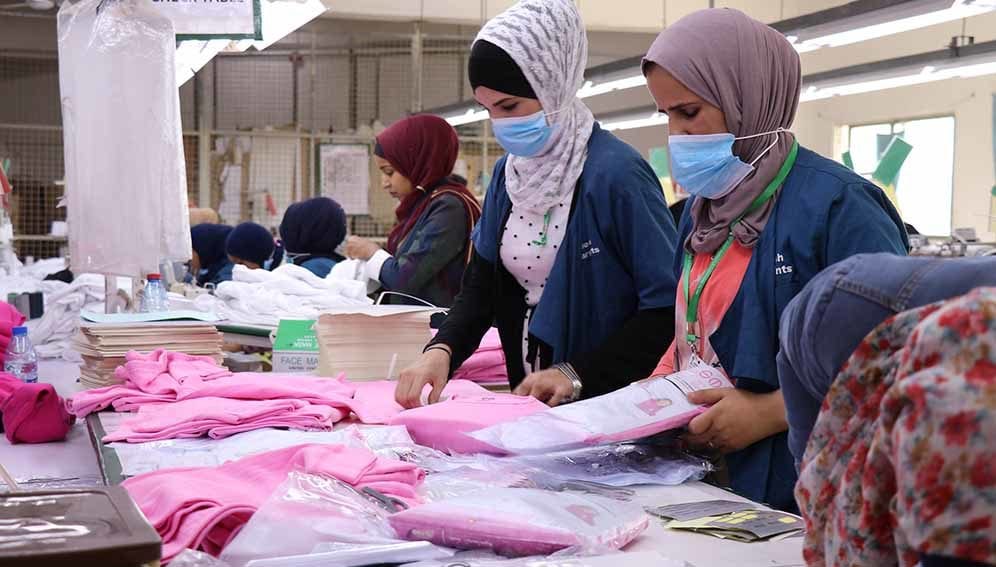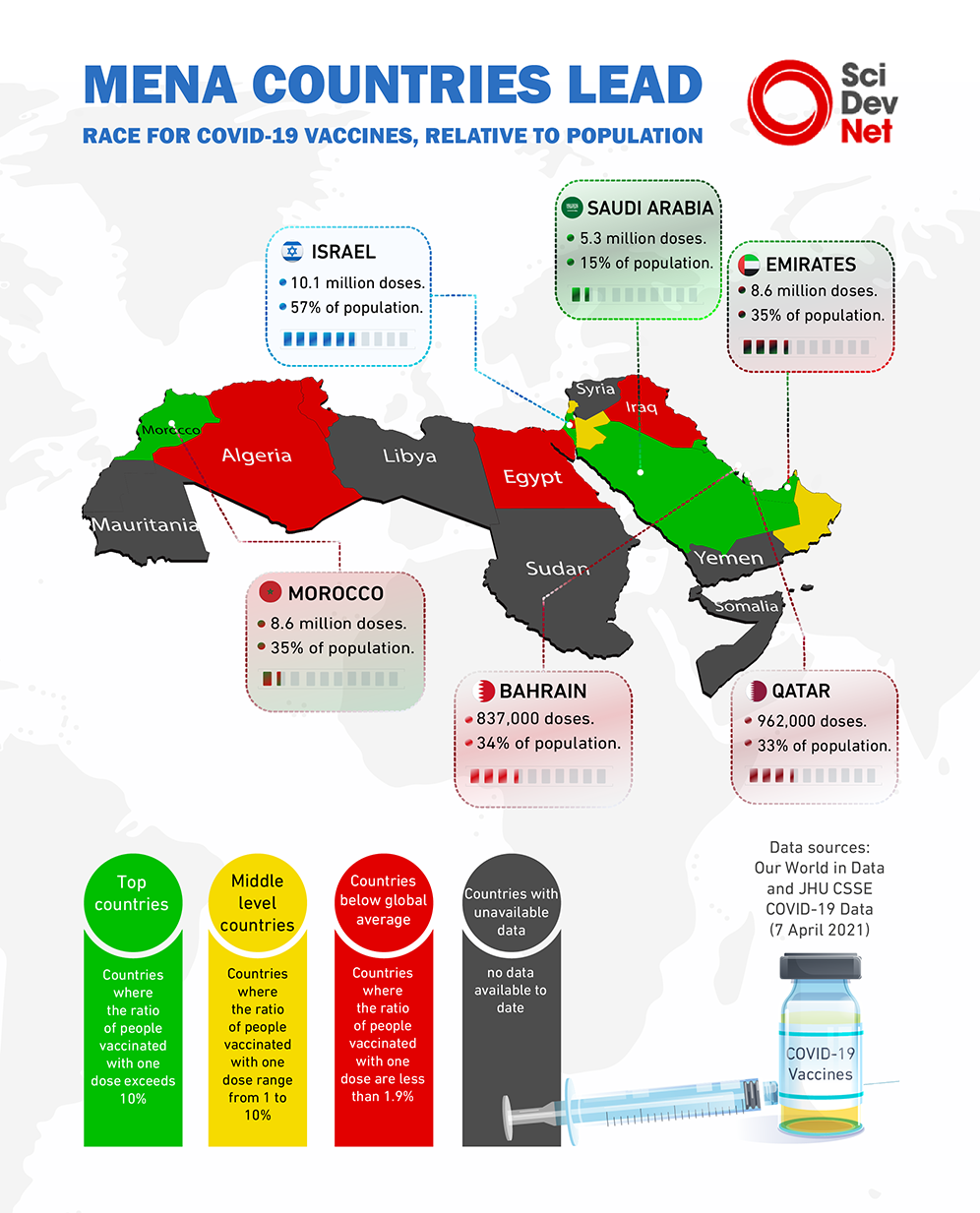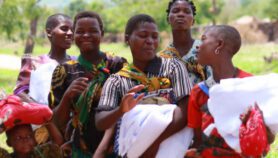19/04/21
Mideast refugees left behind in COVID-19 vaccine race

By: Abdallah Taha
Send to a friend
The details you provide on this page will not be used to send unsolicited email, and will not be sold to a 3rd party. See privacy policy.
COVID-19 vaccination rates in the Middle East are among the highest in the world, but huge gaps exist between neighbouring countries, health leaders say, warning that refugees risk missing out.
Bahrain and the United Arab Emirates (UAE) are among the region’s leaders in vaccination, in terms of percentage of the population covered, following some way behind Israel, the top-ranking country in the world.
UAE tops the rankings of Arab countries, with 2 million people – 22 per cent of the population – fully vaccinated. In Bahrain 250,000 – 16.4 per cent – have completed the two-stage vaccination process, while Saudi Arabia has fully vaccinated more than 4 million people – 12 per cent of the population, according to figures quoted by officials at the World Immunisation and Logistics Summit.
“In wars and conflicts, people would always prioritise getting food and fundamentals, leaving no place for thinking about getting the vaccine,”
Ghassan Aboud, founder, Orient for Human Relief
However, power cuts and logistical difficulties in reaching remote, conflict-stricken areas are hindering the rollout of the vaccine in many places, along with challenges of transporting and storing the vaccine at the required temperature, the summit heard last month.
Getting vaccines to the region’s 17 million refugees and displaced people with almost no health systems, and other populations affected by conflicts, is also a huge challenge, says Ghassan Aboud, founder of Orient for Human Relief (OHR).
“In wars and conflicts, people would always prioritise getting food and fundamentals, leaving no place for thinking about getting the vaccine,” Aboud told the summit, convened virtually in Abu Dhabi on the theme “Collaboration, cooperation and optimisation of global vaccine distribution”.
Underlining the importance of equitable vaccine distribution, Rana Hajje, regional director for the Eastern Mediterranean Regional Office (EMRO) of the World Health Organization (WHO), told attendees: “No one will be safe, unless we all are.”
Mariam el-Hajiri, assistant undersecretary for primary care and public health at the Ministry of Health in Bahrain attributed the country’s success to its targeted immunisation campaign. “We aimed to reach elderly people through special campaigns that went to their homes,” she explained.
In the UAE, Hussein el-Rand, assistant undersecretary for health centres and clinics and public health, at the Ministry of Health, said the country’s flexible health system combined with a comprehensive medical awareness among the population has resulted in a successful vaccine campaign.
Both Bahrain and UAE have been part of Phase three clinical trials for the Chinese vaccine, Sinopharm. The National Health Regulatory Authority in Bahrain has also approved all five existing vaccines after testing their safety and efficacy, while UAE has approved four of the five – Sinopharm, Pfizer, Sputnik V, and AstraZeneca.



Saudi Arabia, which has only approved the Pfizer and AstraZeneca vaccines, meanwhile faces the challenge of huge numbers descending on the country for the Hajj and Umra pilgrimage seasons.
This year numbers for the Hajj have been restricted to about 10,000 and only from within the kingdom, as opposed to the 2.5 million who arrived in 2019 from all over the globe. Vaccination is obligatory for everyone who applies, and all doses must be complete a week before the pilgrimage begins in July.
Hani Jokhdar, Saudi’s deputy minister for public health, told the summit: “Even if we couldn’t get rid of the virus, at least we should maintain safe space, and Saudi Arabia is striving to be among this space”.
All Arab countries in the region are members of COVAX, the facility for equitable access led by GAVI, the Vaccine Alliance, the World Health Organization (WHO), and the Coalition for Epidemic Preparedness Innovations (CEPI), which aims to distribute 2 billion doses globally in 2021.
Rollout began last month and all 22 countries in the region have begun the vaccination process.
Starting in March, an initial 800,000 doses were distributed via COVAX in Sudan, then 360,000 in Yemen, 854,000 in Egypt, and 365,000 in Algeria, official figures show. All are AstraZeneca vaccines.
COVAX has allocated five per cent of its funds for humanitarian needs, and vaccination has begun in Zaatari refugee camp in Jordan with doses donated from the European Union.
However, NGOs warn this is not enough. “These quantities are not a big deal, if compared to the population,” said Aboud.
Commenting on the vaccine nationalism exhibited by some countries, Simon Bland, executive director of the Global Institute for Disease Elimination (GLIDE), told the summit: “The pandemic knows no boundaries.”
This article was produced by SciDev.Net’s Middle East and North Africa desk and edited for clarity.















